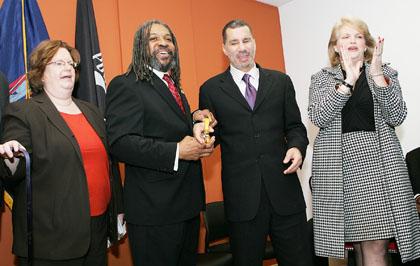By Jeremy Walsh
A nonprofit organization fighting drug addiction in New York City since 1967 got a visit from Gov. David Paterson last week as it unveiled its new headquarters in Astoria.
“You can’t contain drugs and you can’t contain human misery,” Paterson said at the ribbon−cutting ceremony for Reality House Inc., which relocated from his former district when he was a state senator in Harlem. “There are just as many drug problems in Forest Hills or Grosse Point as the inner city.”
Reality House’s new facility at 34−51 Vernon Blvd. in Astoria offers outpatient treatment to as many as 150 veterans. By 2011, they hope to have moved into a new building next door to the current address with beds for 30 veterans.
Lenard Hebert, the group’s executive director, said the nonprofit left Harlem in 2006 for a temporary location on Broadway in Manhattan after running into money troubles. The group was founded in 1967.
During his keynote address, Paterson touted the state Legislature’s easing of the Rockefeller Drug Laws, which mandated prison time for drug offenses, and hailed Reality House for pioneering treatment programs that have been widely imitated over the last four decades.
“We know you will bring the same hope to Queens as you did to Harlem for so many years,” he said, noting 50 percent of people arrested in the state are under the influence of alcohol or drugs.
State Assemblywoman Cathy Nolan (D−Ridgewood) also welcomed the treatment center and the additional services it will bring to the borough’s marginalized population.
“Nothing is more heartbreaking than to go next door to Phoenix House and meet with as many as 40 or 50 young men just out of the prison system and wonder what’s there for them,” she said.
While Reality House waits for its permanent home to be finished, Hebert said the group’s plan is to identify as many veterans groups as possible, like the Borden Avenue Veterans Shelter in Long Island City, which houses as many as 243 homeless veterans from throughout the city.
“For starters, we have a group of veterans not eligible for VA services because they received other−than−honorable discharges,” said shelter director Darren Skinner, noting that between 45 percent and 55 percent of the veterans staying at the facility at any given time have drug problems. “It’ll help them to address their alcohol and drug issues. It’s very important.”
Although the governor said drug addiction was a serious matter, he did indulge in a moment or two of levity during the ceremony. After cutting the ribbon, he rapidly handed off the ceremonial scissors.
“They did not want me to hold a sharp object for any period of time,” he joked.
Reach reporter Jeremy Walsh by e−mail at jewalsh@cnglocal.com or by phone at 718−229−0300, Ext. 154.



































